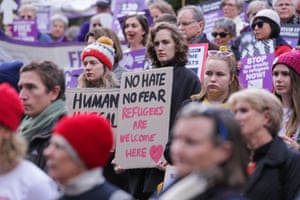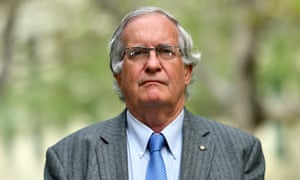Extract from The Guardian
As conditions become critical for dozens of children, paediatrician
Paul Bauert is alerting MPs to an emergency they can no longer ignore
Paediatrician Paul Bauert has spent days roaming
the corridors of Parliament House trying to get politicians to focus on
what’s happening on Nauru.
There’s a recurrent observation from the political class that chills him. In an interview with Guardian Australia’s Politics Live podcast he says: “It almost brings me to tears when one of the politicians, or one of the politician’s minders ask me … ‘Do you think it will take a death before things change?’
“I cannot, for the life of me, understand where that thinking comes from, truly: ‘Do you think it will take a death?’”
Bauert, a Darwin-based physician who represents paediatricians on the council of the Australian Medical Association, has come to Canberra with the objective of keeping kids alive. He has become the public face of a campaign to bring children on Nauru to Australia, and in parliament, has become a private force for change.
He’s finding some allies. Liberal and Labor MPs are starting to find their voice on the issue. Four Liberals have broken ranks in recent days to press for the removal of children from offshore immigration detention, and nine Labor MPs used their caucus meeting on Tuesday to tell Bill Shorten action was required. Crossbenchers in both chambers are in discussions with the immigration minister, David Coleman.
Scott Morrison has put resettlement in New Zealand back on the table, but only if the parliament passes legislation stopping resettled asylum seekers coming to Australia. Labor is saying no. One of the Liberals agitating within his own ranks for change, the Victorian Russell Broadbent, has made a personal appeal to Bill Shorten to change his mind.
Bauert has been involved with assessing children in immigration detention since they were held onshore in northern Australia. When processing went offshore, he remained involved, reviewing the clinical notes of treating medical teams when cases were taken to court.
Until recently, his services were being called upon a couple of times a year, but things have escalated in recent times. He’s reviewed the clinical notes of 14 children over the past few months.
"I think politicians are finally understanding … we risk losing a child unless all of them are removed rapidly"
Over the course of this week, in Canberra with refugee advocates, Bauert has been trying to engage the attention of politicians by recounting the cases of two Iranian children on Nauru, a 12-year-old girl and her 14-year-old brother. Clinicians at Westmead hospital asked him to make an assessment of their wellbeing.
He tells the podcast the cohort at serious risk on Nauru are kids aged from about eight through to adolescents. The children have developed resignation syndrome. “They’ve decided death is a better option.”
Bauert says these children “have become particularly suicidal since they were shut off from the possibility of going to the United States. Several children I’ve had to deal with are Iranian – they are feeling helpless and hopeless”.
The 12-year-old girl has been assessed by a psychiatrist as being at serious risk of suicide. She has not eaten any solid food for three weeks. “Her father was struggling to get 100ml of Sustagen into her, she’d become bed-bound, she told her parents she wanted to die and kill herself.”
Her brother was first aggressive, then bed-bound. He’s also refusing food. “His blood results suggest he’s in the early stages of organ failure.”
Bauert examined both the notes and the children via a mobile phone, with their father assisting with the examination. He’s working to get them removed, but worries that if the process drags on, one or both of them could die.

There’s a recurrent observation from the political class that chills him. In an interview with Guardian Australia’s Politics Live podcast he says: “It almost brings me to tears when one of the politicians, or one of the politician’s minders ask me … ‘Do you think it will take a death before things change?’
“I cannot, for the life of me, understand where that thinking comes from, truly: ‘Do you think it will take a death?’”
Bauert, a Darwin-based physician who represents paediatricians on the council of the Australian Medical Association, has come to Canberra with the objective of keeping kids alive. He has become the public face of a campaign to bring children on Nauru to Australia, and in parliament, has become a private force for change.
He’s finding some allies. Liberal and Labor MPs are starting to find their voice on the issue. Four Liberals have broken ranks in recent days to press for the removal of children from offshore immigration detention, and nine Labor MPs used their caucus meeting on Tuesday to tell Bill Shorten action was required. Crossbenchers in both chambers are in discussions with the immigration minister, David Coleman.
Scott Morrison has put resettlement in New Zealand back on the table, but only if the parliament passes legislation stopping resettled asylum seekers coming to Australia. Labor is saying no. One of the Liberals agitating within his own ranks for change, the Victorian Russell Broadbent, has made a personal appeal to Bill Shorten to change his mind.
Bauert has been involved with assessing children in immigration detention since they were held onshore in northern Australia. When processing went offshore, he remained involved, reviewing the clinical notes of treating medical teams when cases were taken to court.
Until recently, his services were being called upon a couple of times a year, but things have escalated in recent times. He’s reviewed the clinical notes of 14 children over the past few months.
"I think politicians are finally understanding … we risk losing a child unless all of them are removed rapidly"
Over the course of this week, in Canberra with refugee advocates, Bauert has been trying to engage the attention of politicians by recounting the cases of two Iranian children on Nauru, a 12-year-old girl and her 14-year-old brother. Clinicians at Westmead hospital asked him to make an assessment of their wellbeing.
He tells the podcast the cohort at serious risk on Nauru are kids aged from about eight through to adolescents. The children have developed resignation syndrome. “They’ve decided death is a better option.”
Bauert says these children “have become particularly suicidal since they were shut off from the possibility of going to the United States. Several children I’ve had to deal with are Iranian – they are feeling helpless and hopeless”.
The 12-year-old girl has been assessed by a psychiatrist as being at serious risk of suicide. She has not eaten any solid food for three weeks. “Her father was struggling to get 100ml of Sustagen into her, she’d become bed-bound, she told her parents she wanted to die and kill herself.”
Her brother was first aggressive, then bed-bound. He’s also refusing food. “His blood results suggest he’s in the early stages of organ failure.”
Bauert examined both the notes and the children via a mobile phone, with their father assisting with the examination. He’s working to get them removed, but worries that if the process drags on, one or both of them could die.

He says politicians are becoming more alive to the risks, and it has been important for all the major medical groups in Australia to raise their voices in protest.
Bauert says Morrison has inadvertently assisted with the task of getting doctors to go to the barricades for people in immigration detention.
He says the AMA has “lost a couple of years” by starting to lobby for action under the presidency of Dr Brian Owler, then pulling back under the presidency of Dr Michael Gannon, and now stepping forward again under Bartone’s leadership. “What’s happening now should have happened two years ago.”
Bauert says Australia’s border protection policy needs to be called for what it is. He says the practical effect of the policy is 80 children on Nauru, with 30 of them on a critical list, and others at risk of being traumatised by the condition of their peers.
“It’s a policy that seeks to deliberately harm children. I don’t know why we need it. It galls me as a paediatrician. It is terrible for Australia as a nation that we are doing that.”
He says there is only one way to fix it: bipartisan agreement. He says he’s cautiously optimistic that a breakthrough is coming. He points to this week’s “scurry” from the major parties to “maintain political face and show some compassion” – Morrison putting New Zealand resettlement on the table, and Shorten offering to overhaul medical transfer procedures.
“I think politicians are finally understanding … the children are critically ill, and we risk losing a child unless all of them are removed rapidly.”

No comments:
Post a Comment